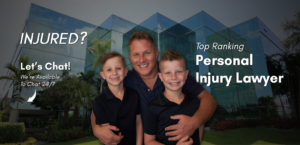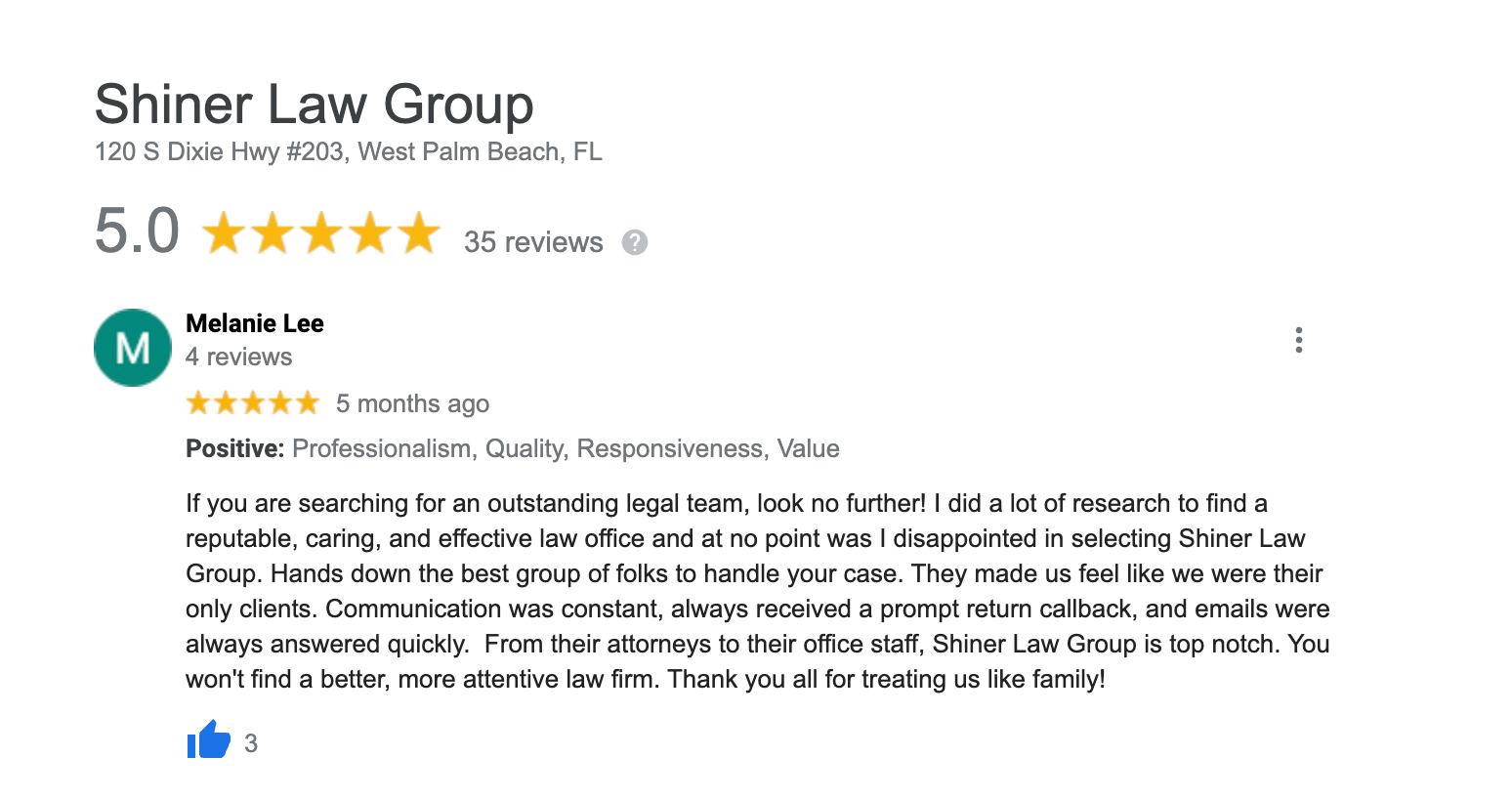 Did you suffer a catastrophic injury from an accident in West Palm Beach, FL? Our experienced West Palm Beach catastrophic injury lawyers at Shiner Law Group are ready to help fight for your legal rights and get the compensation you deserve. Call us today at (561) 777-7700 to speak with an attorney for a 100% free consultation.
Did you suffer a catastrophic injury from an accident in West Palm Beach, FL? Our experienced West Palm Beach catastrophic injury lawyers at Shiner Law Group are ready to help fight for your legal rights and get the compensation you deserve. Call us today at (561) 777-7700 to speak with an attorney for a 100% free consultation.
You may be entitled to seek compensation for medical bills, loss of income, pain, and suffering, and more. Contact our West Palm Beach, FL law offices to discuss the legal options that might be available to you following your catastrophic injury. The next steps are very important. Let Shiner Law Group help you with your catastrophic injury case today.
Did You Suffer A Catastrophic Injury In West Palm Beach?
The beautiful natural environment of West Palm Beach and the thriving shops and restaurants in the area combine to make an atmosphere here that tourists and residents alike love. However, for all the beauty and excitement West Palm Beach offers these features and venues—and even the roadways that one must take to reach them—cause many injuries. While nobody enjoys an injury, severe injuries take away the ability to work, live independently, or participate in activities that you deeply enjoyed before the accident.
If you or a loved one suffered a catastrophic injury because of someone else’s carelessness or recklessness, you can seek compensation for the expenses and impacts on your quality of life.
A West Palm Beach catastrophic injury lawyer from Shiner Law Group can provide guidance and assistance through this process. Our firm is 100 percent devoted to helping injured people like you recover the maximum amount of compensation available to them. Contact us for a free case evaluation to learn more about the services we provide for you.
What Is a Catastrophic Injury?
 A catastrophic injury is so severe that it will probably limit the sufferer’s ability to conduct everyday tasks such as working or handling personal care and chores independently. The term is most commonly associated with injuries involving the brain, spine, or spinal cord. However, it is also frequently used to refer to other types of serious injuries that majorly compromise an individual’s ability to function and to earn an income.
A catastrophic injury is so severe that it will probably limit the sufferer’s ability to conduct everyday tasks such as working or handling personal care and chores independently. The term is most commonly associated with injuries involving the brain, spine, or spinal cord. However, it is also frequently used to refer to other types of serious injuries that majorly compromise an individual’s ability to function and to earn an income.
Types of Catastrophic Injuries
Not all serious injuries are catastrophic. Catastrophic injuries, however, produce permanent deficits that will not subside. Here is a look at the conditions most commonly associated with catastrophic injuries.
Traumatic Brain Injuries
A traumatic brain injury damages the brain through a blow to the head or body.
The most common causes of traumatic brain injuries include:
- Falls, either from the same elevation or from height.
- Traffic-related accidents, including accidents involving cars, motorcycles, commercial trucks, buses, ride-shares, or even bicyclists or pedestrians.
- Acts of violence including, child abuse or gunshot wounds.
- Sports and recreational activities, such as football or diving.
- Combat-related military activities, including explosive blasts and transportation accidents.
The brain is arguably the most important organ in the body, as it controls all the body’s other functions and involuntary responses. Despite its importance, the brain has only a limited ability to heal itself from injury. The brain injury will often result in permanent deficits. The deficits acquired in the injury depend not only on the severity of the injury but also on the injured area of the brain.
Common deficits associated with traumatic brain injuries include:
- Loss of memory.
- Difficulty paying attention.
- Difficulty controlling one’s emotions, behaviors, or impulses.
- Difficulty speaking or understanding spoken or written language.
- Difficulty organizing thoughts or ideas or participating in a conversation.
- Depression or anxiety.
- Severe mood swings.
- Difficulty with balance or coordination.
- Loss of vision or sight.
Brain injuries are extraordinarily expensive injuries. The lifetime cost of medical treatment alone after a brain injury can range between $85,000 and $3 million. Added to the high cost is the uncertainty of whether the injured individual can return to work.

Spinal Cord Injuries
As with brain injuries, the most common causes of spinal cord injuries include motor vehicle accidents, falls, and violence. The spinal cord is a tight bundle of nerves and cells that sends signals from the brain to the rest of the body. This bundle, protected by the bony covering of the spinal vertebrae and cushioning of the spinal discs, extends from the base of the skull to the waist area. Contrary to popular belief, a spinal cord injury rarely involves a cord that is completely severed. Instead, the cord is generally intact but damaged.
Spinal cord injuries commonly produce a loss of sensation and function to the body below the injury site, a condition known as paralysis. If the injury occurs high up on the cervical (neck) area of the spinal cord, the paralysis may extend to all four limbs, the shoulders, torso, diaphragm, and hips. This condition is called quadriplegia, or tetraplegia. If the injury occurs lower on the spine, the sufferer will likely experience paralysis to the legs, feet, pelvis, and hips. This condition is known as paraplegia.
The paralysis caused by the spinal cord injury is generally permanent and can have extreme impacts on the sufferer’s ability to live or attend to personal needs independently.
Additionally, the injury often results in complications, including:
- Loss of bladder and bowel control.
- Loss of skin sensation, which puts you at risk of further injuries from contact with surfaces that are too hot or too cold as well as the risk of bedsores from the inability to sense when it is time to change positions.
- Circulatory issues, including blood clots and low blood pressure.
- Difficulty breathing or expelling secretions from the lungs, which places you at risk for pneumonia.
- Loss of muscle tone.
- Changes to sexual function.
- Chronic pain, most often experienced by individuals with incomplete injuries—injuries where the victims retain some sensation and function below the injury site.
Injuries Involving the Spine
The spinal column not only houses the spinal cord but also plays a crucial part in an individual’s ability to move and balance. It consists of 33 vertebrae, bones that spinal discs separate. The discs consist of a tough elastic material that allows the back to bend or twist. Damage to these bones and discs can result in difficulty moving, bending, or lifting, or cause deformity of the back, as well as other difficulties such as chronic pain.
Often, the injury will require surgery—or even multiple surgeries—to repair. Because of the proximity of the vertebrae and discs to the spinal cord itself, an additional risk of injuries involving the spine is that the damage can extend to the cord and result in further complications such as nerve damage or loss of bowel and bladder control.
Loss of Hearing or Sight
Humans rely on their senses of hearing and sight to recognize danger and loved ones and to accomplish tasks in or out of the home safely and efficiently. Losing either of these senses affects how an individual earns an income or lives independently.
You needn’t completely lose hearing or sight to lose your ability to lead a normal life. Loss of eyesight can also include visual cloudiness, the inability to perceive the size and shape of objects, or the inability to perceive the nearness of objects. The loss of hearing often makes having conversations with others extremely difficult and can lead to depression and feelings of isolation. Hearing loss can also involve other unpleasant symptoms, including dizziness or ringing in the ears.
Burns
Serious burns not only damage the skin and fatty tissue beneath it, but can also damage the muscle and bones. Burns can cause life-altering complications, including infections caused by bacteria entering the body through the area where the skin is damaged, as well as a dangerous loss of bodily fluids. Complications that can be permanent or require surgical repair include scars tightening around joints that reduce mobility and scars on visible areas of the body such as the face or arms.
Limb Amputations
A traumatic limb amputation removes a limb – such as an arm, leg, finger, or toe—because of an accident or injury. Often in accidents involving motor vehicles, contact with sharp metal objects in the vehicle, sever the limb. In some cases, surgeons remove the limb at the hospital due to the extreme severity of the injury. This may prevent further damage or pain to the sufferer from infection or other complications. In some cases, doctors can clean and surgically reattach severed limbs.
The loss of a limb can cause complications, including phantom pain, which involves a feeling of pain coming from the limb that is no longer there. Phantom pain generally begins within the first week after amputation, but can take months or even years to develop. While doctors do not understand the cause of phantom pain, they generally believe it results from the spinal cord and brain attempting to contact the amputated part of the body.

How Florida’s Laws Address Catastrophic Injuries
In Florida, if you obtain a catastrophic injury because of someone else’s careless or reckless actions, you can seek compensation for the extraordinary expenses and impacts you have incurred and likely will incur in the future as a result of your injury. The difficulty with catastrophic injuries is that compensation really should consider future expenses and impacts given the permanence of this type of injury.
One important consideration to note involves catastrophic injuries that occur as a result of a car accident. As you are likely aware, all drivers who register their vehicles in Florida are required to purchase at least $10,000 in personal injury protection (PIP) coverage. This no-fault insurance coverage may pay your medical expenses and replace a portion of your lost wages if you are injured in a car accident, regardless of fault. In exchange for the relative ease of seeking compensation for your injury through your own insurance policy, most car accident victims cannot file a personal injury claim against the at-fault party unless they either limit their PIP policy out, or they meet the state’s serious injury threshold.
Florida’s serious injury threshold provides access to the court system to file a lawsuit seeking compensation from the at-fault party and includes injuries that:
- Result in a significant and permanent loss of an important bodily function.
- Result in permanent injury within a reasonable degree of medical probability, except scarring and disfigurement.
- Result in significant and permanent scarring and disfigurement.
- Result in death.
Catastrophic injuries almost always meet this threshold, enabling victims to seek a larger number of damages, including coverage of lost earning capacity as well as non-economic damages such as pain and suffering or emotional distress. While this compensation is absolutely crucial, many individuals fail to realize that they have a right to it and the personal injury claims process is generally confusing for claimants. Read on for answers to some of the questions our West Palm Beach clients most frequently ask about obtaining compensation after suffering a catastrophic injury.
Frequently Asked Questions About West Palm Beach Catastrophic Injuries
When we think of the victims who are most in need of compensation after an accident, those who have suffered catastrophic injuries are among the first to come to mind. Here are answers to questions about seeking compensation for your West Palm Beach catastrophic injury through the personal injury claims process.
Who is responsible for my West Palm Beach catastrophic injury?
Legal responsibility—also known as liability—for the expenses and impacts of your injury belongs to the individual who caused the injuries to occur.
To prove who injured you, you need to show:
- The at-fault party owed you a duty of care. The duty of care refers to the actions that a reasonable person would take in a given set of circumstances to protect someone else from harm. For example, a driver owes a duty to operate ar motor vehicle safely and legally.
- The at-fault party breached the duty of care.
- The breach in the duty of care resulted in an accident that caused you to sustain injuries. These injuries produced subsequent expenses and impacts.
I have a lot of expenses and impacts from my spinal cord injury. Is there a cap on how much compensation I can receive?
Florida doesn’t cap the compensation you can receive, provided that insurance policies cover it. The amount of insurance that all liable parties have is important to your case because insurance pays most personal injury awards and settlements.
While you may sue an uninsured person and even obtain a judgment in your favor, most individuals cannot afford to pay someone else’s injury expenses out-of-pocket, so you might not collect your award.
The expenses and impacts you can seek compensation for through a personal injury claim include:
- Medical expenses, such as the cost of emergency treatment, ambulance transport, diagnostic testing, surgical services, the services of your physician, prescription medication, hospitalization, physical therapy and rehabilitation, and the provision of assistive devices such as prosthetic limbs, a wheelchair, or crutches. You may include the medical costs you will likely incur in your damage claim.
- Lost wages resulting from being too injured to work.
- Loss of future earning capacity if your injury causes permanent deficits and you can no longer earn in the same capacity as you did before the accident.
- Property damage that you experienced during the same accident that caused your injury.
- Physical pain and suffering.
- Emotional distress.
- Loss of consortium, which is a damage collected on behalf of the injured person’s spouse for the loss of physical intimacy and companionship that is often experienced after a serious injury.
- Loss of the enjoyment of life, which is compensation for being unable to participate in activities and events that you previously enjoyed.
If I obtain a settlement including future expenses for my injury and a cure is later found, do I have to pay the money back?
Catastrophic injuries are so damaging because they involve a high likelihood of permanent deficits that will affect the individual for the rest of their life.
Because you will evaluate your case when your condition has no cure, your award must consider the expenses you will likely face.
If my husband sustained a catastrophic injury and died because of it, can I obtain compensation?
If the death occurred as a result of someone else’s carelessness or recklessness, you can seek compensation for the losses you incurred as a result of your husband’s death through a wrongful death lawsuit.
A personal representative of the deceased’s estate must file the claim within two years of the death. The family members who can benefit from this action include the spouse, parents, or children of the deceased, as well as others who partially or wholly depended on the deceased for support and services.
You can receive compensation for:
- The loss of services and support provided by the deceased to their family members.
- The loss of care, guidance, and instruction that the deceased provided to their children.
- The loss of companionship and protection that the deceased provided to their spouse.
- Mental pain and suffering.
- The cost of medical treatment for the deceased’s final injuries.
- Funeral and burial expenses either paid by the estate or directly by a family member.
- Wages and benefits lost between the time of the injury and the time of death.
- The loss of earnings the deceased would have earned during their career had they survived the accident.
How much is the average catastrophic injury case worth in West Palm Beach?
Lawyers base personal injury claims on the unique aspects of the cases they represent, including the severity of the individual’s injury, the amount of time they missed from work, and many other factors. Because each case is unique, there really is no “average” value to a catastrophic injury case.
There are, however, several factors that can impact the value of your claim, including:
- The amount of insurance the at-fault party has.
- The severity of your injury.
- The amount of money you were earning at the time of the accident.
- Your ability to earn an income in the future.
- How patient you are with the settlement process. While it is not necessarily hard to get a settlement offer, getting a settlement offer that fairly compensates you for your injuries often takes a while. Parties can negotiate settlements from when the at-fault party’s insurance provider receives a demand package until a court renders a decision.
When should I speak with a lawyer after an accident in which I suffered a catastrophic injury?
The statute of limitations for a personal injury case in Florida is two years. This doesn’t mean, however, is that you should wait for three years and eleven months to speak with an attorney. If you have suffered a catastrophic injury because of someone else’s carelessness or recklessness, the best time to contact an attorney is as soon as possible.
There are many reasons for that, including:
- The attorney has the time to properly investigate your case, determining all sources of liability and all insurance resources that can provide your compensation.
- The attorney can take over communication with the at-fault party’s insurance adjuster. Insurance adjusters try to reduce or eliminate payouts on third-party claims, including tricking you into making “statements” or authorizing them to look at your medical records. Having an attorney from the start means you can avoid being the target of those tactics.
- You have an opportunity to get a better picture of the expenses and impacts involved with your injury, which can help your attorney properly value your case.
- Your attorney can begin gathering the evidence and witness testimony necessary to prove your claim.
- Your attorney can begin settlement negotiations. Often accident victims will receive a settlement offer very early after the injury. These offers are often low and provided in exchange for a quick resolution to the case. Accepting this initial offer is almost always a mistake and you can’t undo it. Once you agree to a settlement, you cannot go back later and ask for more money.
Can I prove that a broken bone is a catastrophic injury?
It depends on the location of the break, the severity of the break, how the break affected your ability to use the limb or part of your body involved, and how it affected your ability to earn an income. While you may not prove that the injury is catastrophic, our experienced attorneys can explore your options.
Will I have to pay taxes on the settlement I received for my catastrophic injury case?
For the most part, no. According to the Internal Revenue Service (IRS), settlements and awards received as compensation for personal injury are not income or taxable.
However, the IRS taxes punitive damages. Courts award punitive damages in some cases not to compensate for the injury, but to financially punish a defendant for particularly reckless behavior. Because punitive damages do not compensate for the injury, the IRS may tax the punitive damage portion of your award.
An additional consideration to note: If you claimed medical expenses as tax deductions and then later obtained an award or settlement that included medical expenses, you must pay what you deducted.
I can’t afford an attorney. Can I file a West Palm Beach catastrophic injury case without one?
The experienced catastrophic injury lawyers at Shiner Law Group understand the hesitation that individuals often experience regarding hiring an attorney to help them with their legal claim. How much is it going to cost? Can you do the work involved in proving your claim without one?
The difference between having an attorney and not having an attorney can be thousands—or even hundreds of thousands—of dollars in compensation.
A claim requires understanding the information you must gather, the documents you must file, and the formalities and requirements involved in every step.

Catastrophic Injury Attorney, David Shiner
Because you need an experienced attorney to guide you, we are pleased to offer:
- A free case evaluation, which is time for you to obtain answers about your specific case as well as to learn more about the process of obtaining compensation through a personal injury claim and the services we can provide to help you achieve that.
- A contingent-fee payment plan. What this means is that you do not have to pay for your attorney’s services until there has been a positive outcome to your case.
Call Our West Palm Beach Catastrophic Injury Lawyers Today
Let’s explore your legal options for obtaining compensation for the expenses and impacts of your catastrophic injury. For your free case evaluation with a West Palm Beach catastrophic injury lawyer, contact us online or by calling (561) 777-7700.
West Palm Beach Animal Bite Lawyer Review

West Palm Beach Catastrophic Injury Law Office
Shiner Law Group
1601 Belvedere Rd E-300 #21
West Palm Beach, FL 33406



